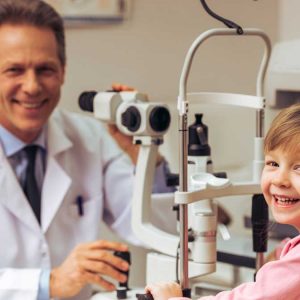What does a pediatric optometrist do?
Children need eye care just as much as adults do. In fact, approximately one in four children use some form of corrective lenses to help their vision. If you’re preparing for a child’s eye exam, this guide will help you understand what pediatric optometrists do.

What is a pediatric optometrist?
A pediatric optometrist is an eye doctor who specializes in examining children. They look for early signs of vision loss, as well as color blindness and overall eye health.
Pediatric optometrists may use child-friendly visual aids to make it easier to assess a child’s visual needs. They also ask questions using age-appropriate terms to get a better understanding of a child’s optical clarity.
What kind of eye doctor should my child see?
A pediatric optometrist is usually the first eye doctor a child will see. The child may be referred to a pediatric ophthalmologist if they need eye surgery or specialized vision loss treatment.
Many family eye doctors offer pediatric optometry. While some clinics exclusively offer eye care for children, if your eye doctor serves clients of all ages, you should consider taking your child to the optometrist you’re already comfortable with.
How often should a child see the eye doctor?
Eye care can start as soon as a child is born, but many children see an eye doctor once they reach school age. After the first eye exam, most children only need to see the optometrist every 2-3 years. Children who wear corrective lenses may need annual eye exams to update their prescriptions. Vision changes happen rapidly in young children and tend to plateau in adulthood.
What to expect during a pediatric eye exam
During the eye exam, the pediatric optometrist will conduct tests to determine how well a child can see. They’ll also evaluate the child’s eye health to look for signs of optical diseases.
If your child needs corrective lenses, the doctor will discuss your options with you (glasses, contacts, etc.). Then you’ll receive a prescription for your child’s lenses. Some optometrist offices have frames and contacts in-office, and others may refer you to a secondary provider.
Eye insurance typically covers child eye exams, though you may have a small copay. Coverage varies for corrective lenses, but the office can provide a quote based on your insurance plan.
